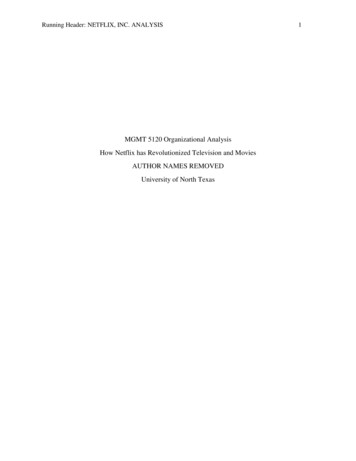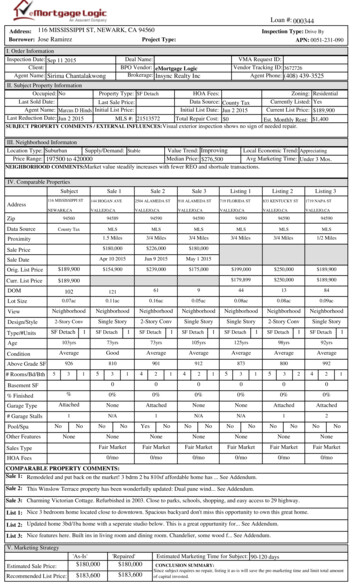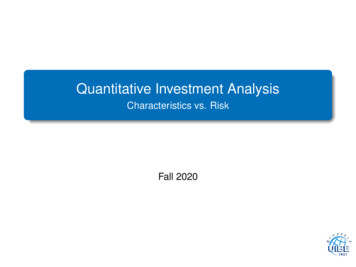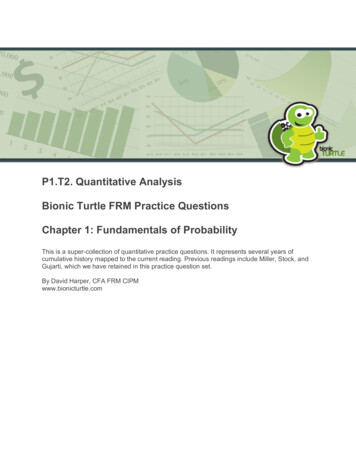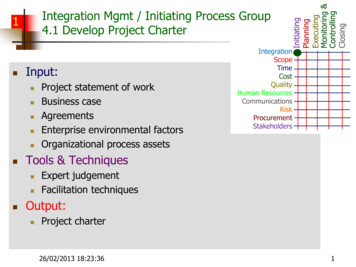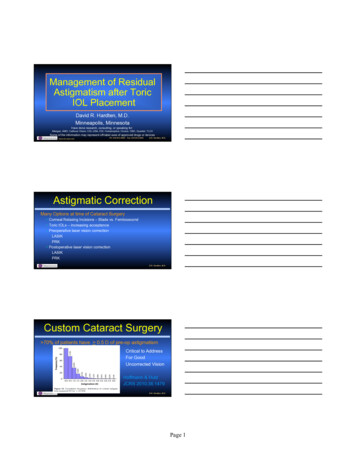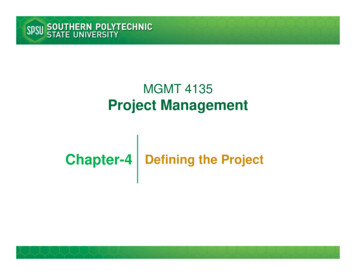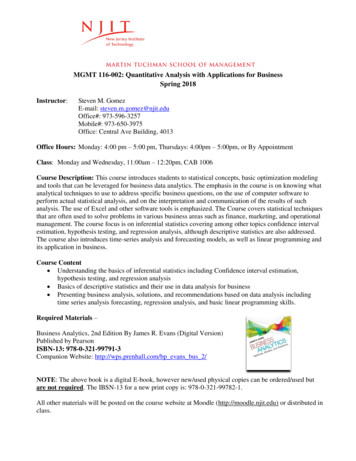
Transcription
MGMT 116-002: Quantitative Analysis with Applications for BusinessSpring 2018Instructor:Steven M. GomezE-mail: steven.m.gomez@njit.eduOffice#: 973-596-3257Mobile#: 973-650-3975Office: Central Ave Building, 4013Office Hours: Monday: 4:00 pm – 5:00 pm, Thursdays: 4:00pm – 5:00pm, or By AppointmentClass: Monday and Wednesday, 11:00am – 12:20pm, CAB 1006Course Description: This course introduces students to statistical concepts, basic optimization modelingand tools that can be leveraged for business data analytics. The emphasis in the course is on knowing whatanalytical techniques to use to address specific business questions, on the use of computer software toperform actual statistical analysis, and on the interpretation and communication of the results of suchanalysis. The use of Excel and other software tools is emphasized. The Course covers statistical techniquesthat are often used to solve problems in various business areas such as finance, marketing, and operationalmanagement. The course focus is on inferential statistics covering among other topics confidence intervalestimation, hypothesis testing, and regression analysis, although descriptive statistics are also addressed.The course also introduces time-series analysis and forecasting models, as well as linear programming andits application in business.Course Content Understanding the basics of inferential statistics including Confidence interval estimation,hypothesis testing, and regression analysis Basics of descriptive statistics and their use in data analysis for business Presenting business analysis, solutions, and recommendations based on data analysis includingtime series analysis forecasting, regression analysis, and basic linear programming skills.Required Materials –Business Analytics, 2nd Edition By James R. Evans (Digital Version)Published by PearsonISBN-13: 978-0-321-99791-3Companion Website: http://wps.prenhall.com/bp evans bus 2/NOTE: The above book is a digital E-book, however new/used physical copies can be ordered/used butare not required. The IBSN-13 for a new print copy is: 978-0-321-99782-1.All other materials will be posted on the course website at Moodle (http://moodle.njit.edu) or distributed inclass.
Software (Required):Microsoft Excel – Available as part of Microsoft Office 2013, or 2016 (Windows OS); Office: Mac 2011or 2016 (Mac OS); Free Download at http://ist.njit.edu/software-available-download/ . Please be aware ofthe difference among versions in features and layout. If needed, please take advantage of on-campuscomputersLearning Goals and Outcomes addressed in this course: Develop a variety of business analytical skillsGain mastery of useful skills to process business dataHave knowledge of common statistical tools that may be applies to solving general and practicalbusiness problemsHave basic knowledge of modeling and optimization with software applicationsApply the acquired knowledge and skills to the solution of business problems, knowing how to selectthe technique(s) appropriate for solving a particular problem and how to execute the technique(s)Know how to interpret and communicate the results of business analysisAnalytical andProblem SolvingSkillsXInformation andCommunicationSkillsXInterpersonalSkillsand TeamDynamicsXEthicalTechnologyReasoning SkillsGlobalizationXXXAnalytical and Problem Solving SkillsDevelop skills to critically analyze and solve business problems.Apply these skills to practical case study projects, which require critical thinking and strong problemsolving skills.Information and Communication Skills Develop skills to search databases, locate and use data to analyze business problems and recommendsolutions, properly cite data sources. Advance skills that enable effective business writing. Practice articulating accounting concepts and gaining perspective on discussion questions through class participation.Interpersonal Skills and Team Dynamics Demonstrate the skills of working in teams and achieving common goals. Develop management andleadership skills. Understand team roles and relationships that foster cooperation toward goals. Learn how to manageexpectations and deadlines.Ethical ReasoningDevelop skills to identify ethical dilemmas. Develop a sense of ethical and professional behavior.Technology SkillsPrepare effective Excel spreadsheets, graphs, and a PowerPoint presentation.
GlobalizationUnderstand the impact of globalization and the complexity it brings.Grading and EvaluationMidterm Exams (2)Final ExamGroup & Individual Case Projects (2):Homework AssignmentsLab dle: There is a Moodle site (at http://moodle.njit.edu/) for this course on which documents will beposted as needed. Login to Moodle using your UCID and password. All announcements, assignments,changes, etc. are posted there. The student is responsible for remaining up to date at all times. I will send emails to the class through Moodle. By default, Moodle uses your NJIT email address. If you do not checkthat regularly, you must change the address in your Moodle profile to one that you do check. There is noexcuse for not receiving information sent to the class via email.Class Projects: There will be two (2) projects required for this course:o Individual Project: Data Visualization for Performance Lawn Equipment Details on Page 94 ofTextbooko Group Project: Financial Projections for Small Business Groups of 3-4 students will choose a small business and develop/present formalfinancial projections including assumptions, spreadsheet, visualizations, andrecommendations. For both projects, additional details will be provided including spreadsheet templates, projectrequirements, base-line assumptions, and business objectives to support group project.Grading ScaleAB 90%85%BC CDF80%75%70%60% 60%Grades are to reflect the level of understanding of course content. Therefore, to achieve the grade of A or B inthis class expect to: Attend 100% of the classes. During class new content is explained and then applied using in- classexercises and activities for better understanding.Come to class prepared 100% of the time. This means completing homework prior to class tothe best of your abilities. To maximize learning and your competitiveness in the workplace STUDY IT! WORK IT! Don’t give up.READ IT! COMPLETE IT! Bring your questions to class.Actively participate in class discussions, exercises, and activities to further understanding.Expect the grade of C or lower with less preparation and participation.
Incompletes (I) are only given under special circumstances such as severe illness not for beingunprepared for class or exams.Academic Integrity:“Academic Integrity is the cornerstone of higher education and is central to the ideals of this course and theuniversity. Cheating is strictly prohibited and devalues the degree that you are working on. As a member ofthe NJIT community, it is your responsibility to protect your educational investment by knowing andfollowing the academic code of integrity policy that is found les/academic-integrity-code.pdf.Please note that it is my professional obligation and responsibility to report any academic misconduct to theDean of Students Office. Any student found in violation of the code by cheating, plagiarizing or usingany online software inappropriately will result in disciplinary action. This may include a failing grade ofF, and/or suspension or dismissal from the university. If you have any questions about the code ofAcademic Integrity, please contact the Dean of Students Office at dos@njit.edu”CLASSROOM CODE OF CONDUCTTo maximize learning and help transition to a professional work environment.Success in business depends on the combined performance of the professional team, not the selfcentered interests of one individual. Similarly, a good learning environment is collectivelycreated and requires the contribution of ALL students within the class. To maximize classroomlearning: Attend regularly. Arriving on time and departing when class is dismissed. Prepare for class. Arriving with assignments complete. Engage in learning. Being attentive during class. Giving class your undivided attention and actively contributing to discussion, exercises, and projects.Show respect. Listening attentively to others’ thoughts and ideas.Disruptive behavior includes: No Electronic Devices in Class: Please do not use electronic devices in class unless the use is directlyrelated to the work we are doing. Turn off cell phones, MP3 players, laptops, etc. If you want to use anelectronic device to take notes, please let me know. Taking photos or making audio/visual recordings may not be done without the expressed written permission of the instructorEngaging in side-conversations.Disrespecting others.Using language inappropriate to a professional work environment.Arriving late and departing before class is dismissed.Non-compliance: Exhibiting behavior that disrupts the class learning environment will result in a deduction ofparticipation points. Students may also be asked to leave class.After continued non-compliance a student may be permanently removed from the class.
EXAM CODE OF CONDUCTTo minimize cheating during an exam. Cell phones are to be turned off (not on vibrate) and put away.Dumb calculators may be used.Bags should be zipped up and put in the front of the room.NO leaving the classroom once the exam starts. Therefore, before the exam plan to use the restroom,get water, etc.Attendance & Participation: You are expected to arrive at class on time and stay until the end. You areresponsible for everything that is said in class, which may include material not covered in the readings,modifications to the syllabus, and announcements concerning exams. Class attendance and participation areimportant for student learning. Starting with the second week of class, attendance and participation will beaccounted in students’ course grade. Excused or unexcused absences mean that course material is beingmissed. Students missing classes are responsible to make up the missed material. And, prior information onabsence does not qualify students to have attendance. Of course, medical or other exceptional (withdocuments/proof) cases will be considered. Attendance: Students need to sign attendance sheet, orattendance will be called anytime (beginning, middle or end of the class)Course PoliciesComputer Requirement and Access to the Internet: NJIT requires all students to have access to acomputer at their place of residence. Details as to this requirement may be found on the college’s website onthe page describing NJIT’s Undergraduate Student Computer Requirement.Access to the Internet is required for this course. NJIT provides on campus access to the Internet to allstudents. Details as how to access the Internet as well as other resources at NJIT may be found in theStudent Quick Start Guide.Deadlines/Late Work/Make-ups: Specific policies concerning the acceptance of late work and make-upsare discussed in the sections covering course requirements. In general, work will be accepted late withoutpenalty or allowed to be made-up only if there are extraordinary circumstances beyond students’ control.Students will need to contact the Dean of Students’ office and have it determine that the reasons given fornot doing the work on time are valid.Athletic/Games/Sports team member must submit request from dean for not being able to take test/quiz,before the quiz/test date. This request is not acceptable for Mid-term and Final Test.Extraordinary Circumstances: The predictable demands of family, work and other courses do not meanextraordinary circumstances. Students are expected to be able to balance these with this course’s demands.Being locked out of the class because of late paying tuition is not considered an extraordinary circumstance,unless it can be documented that the Registrar/Bursar’s Office/Financial Aid has made an error. Inability toaccess the Internet or Moodle is not considered an extraordinary circumstance.
Incompletes: Highly discouraged. Incompletes will be given to students only due to major reasons outsideof their control (e.g. major illness, family tragedy, military service). Students must contact the Dean ofStudents’ office and have it determine that the reasons given for not doing the work on time are valid.Students with disabilities: Students with disabilities needing accommodations of any nature so as to have afair opportunity to perform in the class need to contact the counseling center. Staff at the counseling centerwill determine what constitutes a reasonable accommodation and inform the instructor of what it is.
MGMT-115 Section 002 Course & Assignment ScheduleWeek DatesTopic11/23 Course OverviewChapter 1: Introduction to Business AnalyticsAssignmentsHW: Ch 1 (Pg 31) Q’s 1, 2, 3, 4, & 5 (Due: 2/3)Assignment: Ltr to Professor (Due: 2/3)Read/Review Chapters 1 & 221/28,1/30Chapter 2: Analytics on SpreadsheetsExcel BasicsHW: Ch 2 (Pg 50) – Q’s 2, 4, 5, & 6 (Due: 2/10)Read/Review Chapter 332/4,2/6HW: Ch 3 (Pg 91) – Q’s 1, 3, & 13 (Due 2/17)Chapter 3: Visualizing and Exploring DataExcel Intermediate Functionalities for Data Processing Read/Review Chapter 4Class Project #1: Individual (Due 3/15)Data Visualization – Performance Lawn Equipment (Pg 94)4211,2/13Chapter 4: Descriptive Statistical MeasuresExcel Extended Functionalities of Data ProcessingHW: Ch4 (Pg 126) – Q’s 1, 6, 7, & 18 (Due 2/24)Read/Review Chapters 1 - 452/18,2/20Exam #1 – Chapters 1 - 4Read/Review Chapter 562/25,2/27Chapter 5: Probability Distributions and Data Modeling HW: Ch 5 (Pg 173) – Q’s 1, 3, 4, 6, 8, & 9 (Due: 3/10)Read/Review Chapter 673/4,3/6Chapter 6: Sampling and EstimationHW: Ch 6 (Pg 231) Q’s 1, 4, & 8 (Due: 3/17)Read/Review Chapter 783/11,3/13Chapter 7: Statistical InferenceHW: CH 7 (Pg ) – Q’s 2, 5, & 10 (Due: 3/31)Read/Review Chapter 8Project #1 DueSpring Break 3/18 – 3/22 – NO CLASSES9103/25,3/27Chapter 8: Trendlines and Regression AnalysisHW: Ch 8 (Pg 268 ) – Q’s 1, 2, & 5 (Due: 4/7)Read/Review Chapter 9Class Project #2: Group Project (Due 5/6)“Financial Projections Project”114/1,4/3Chapter 9: Forecasting TechniquesHW: Ch 9 (Pg 298) – Q’s 3 & 7 (Due: 4/14)Read/Review Chapters 5-9124/8,4/104/15,4/17Exam #2 – Chapters 5 - 9Read/Review Chapter 11Chapter 11: Spreadsheet Modeling and AnalysisHW: Ch 11 Q’s 1, 7, 14, & 15 (Due: 4/28)Read/Review Chapter 13144/22,4/24Chapter 13: Linear OptimizationHW: Ch 13 TBD (Due 5/5)Read/Review Chapter 14154/29,5/1Chapter 14: Applications of Linear optimizationHW: Ch 14 TBD (Due 5/12)Read/Review Chapters 11-14165/6Review for Final1317Project #2 Due 5/6Final Exam TBD
MGMT 116-002: Quantitative Analysis with Applications for Business Spring 2018 Instructor: Steven M. Gomez E-mail: steven.m.gomez@njit.edu Office#: 973-596-3257 Mobile#: 973-650-3975 Office: Central Ave Building, 4013 Office Hours: Monday: 4:00 pm
